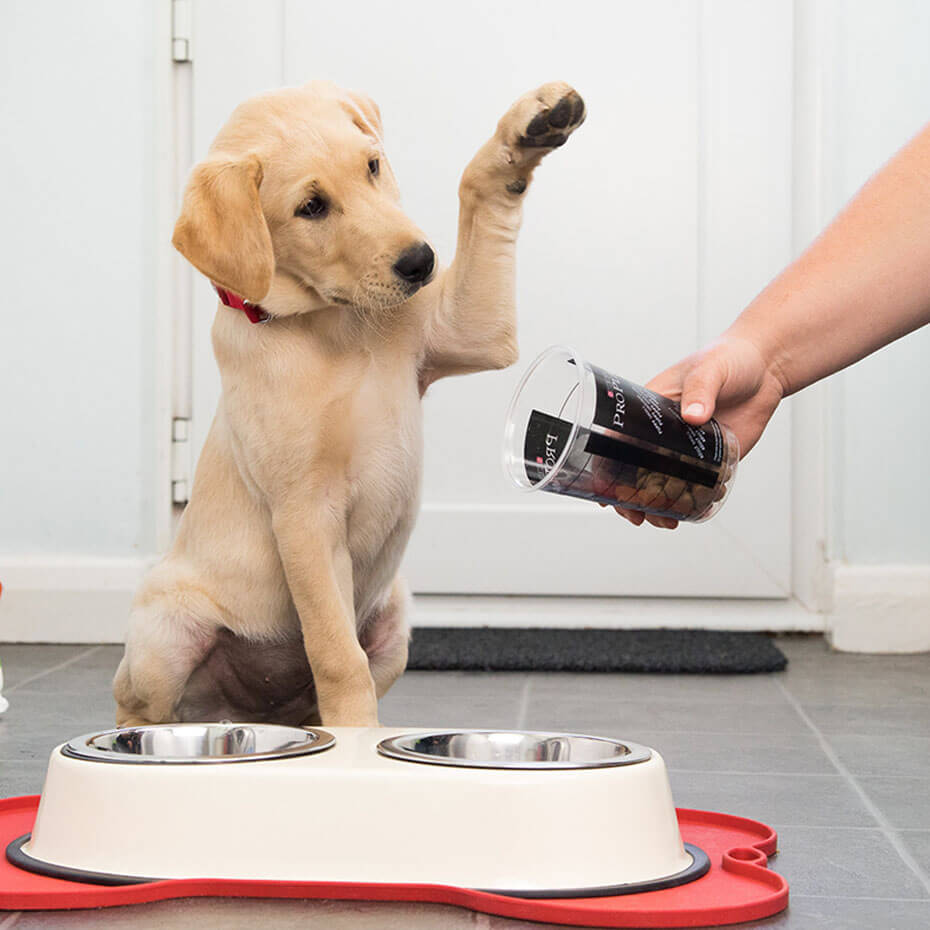
Teach Your Puppy to Stop Begging
Dog begging is a pleading gaze, big doe eyes, or a cute little whine. If your dog behaves like this every time you sit down to have a meal, you know your dog is begging for food or a delicious treat!
Dogs are brilliant at devising new and interesting ways to get exactly what they want from their owners at mealtimes: more food. However, this can be difficult for you as an owner, especially if it happens every time you want to eat.
Fortunately, dog begging can be prevented using a few simple steps.
Causes of dog begging
If your dog or puppy looks uncharacteristically unhappy or hungry when they beg then you won’t be alone. Dogs perfect this method of asking because it is so effective. Playing on your caring nature, they use their best acting skills in the hope of being treated to scraps from the plate. This clever technique means that your dog can often get more food without exerting much effort.
The first thing to realise is that your dog’s begging is a learned behaviour from when they are a puppy, which can be trained out of them. Your begging dog has probably realised at some point that certain behaviours yield certain rewards. Whether it’s pawing, whining or barking, if you reward your puppy begging with what they expect, they will only continue to behave in this way.
Puppies don’t just beg for food, you may also witness your pet begging for affection, playtime or walks. You probably didn’t realise that you were teaching your puppy that begging was effective, but by giving in to their demands, you may have inadvertently promoted their behaviour, which will carry on with them through to adulthood.

How to stop your dog begging
Ignore your dog – even if it’s easier said than done, it’s important to ignore your dog or puppy begging. Since begging is an attention-seeking display, you might feel sympathetic to your pet’s display of feigned vulnerability, and as a result, you give your begging dog what they want to make them feel happy. If this is the case, you simply need to remember that your pet is well-fed and well-cared for and doesn’t need extra food.
Alternatively, your dog’s behaviour may be so effective that giving in is the easiest solution. You need to remember that the more often you give in, the more you will be unwittingly giving rise to this behaviour. Taking a long-term approach might be more frustrating early on, but will pay dividends once your dog learns that begging doesn’t work anymore.
Do not give food
If your dog is begging for food, then ensure you don’t give in and give your dog food while they are begging. Giving them food is a sign of affection, and your clever dog knows it! While it may be harder in practice to reject your dog than it sounds, you simply have to take a hard-line approach until your dog stops the unwanted behaviour. This way your dog will learn that their tactics don’t work with you.
When your dog is begging, don’t give them attention
If your dog is well-cared for and well-fed then you shouldn’t feel bad about not giving extra food to them. Feeling sorry for your dog will mean you’re more likely to give in and encourage the cycle of begging to start all over again. Remember, if you give in to your puppy begging, it will teach your them that begging yields rewards, and this behaviour is likely to last throughout its adulthood too.
Consistent discipline
For any kind of dog training to work, it has to be consistent. This is no different with dog begging. If you consistently enforce that begging yields no reward then your dog is far less likely to carry on begging. You might even reward your dog vocally for good behaviour (e.g. behaving themselves while you eat). If you have a begging puppy, this is even more important, since the training they receive in their early life will shape their behaviour more strongly than that which they receive in later life.
Don’t punish your dog’s begging habits
Even though a puppy begging might be difficult to ignore, punishing your pet will almost certainly have the opposite effect that you intend. Punishment will only show your dog that begging gets them extra attention, and therefore may encourage their behaviour.
When your dog’s begging, patience is key
Since dog begging is learned, your dog’s behaviour won’t change instantly and it will take some time to stop your dog’s unwanted conduct. Since all dogs are different this will vary from pet to pet, but just be prepared to commit long-term and you should gradually start seeing results.
Set a feeding routine
If your begging dog knows exactly when and where he or she will be fed every day, your pet is less likely to beg. You will condition your dog to know exactly when they can eat and when they can’t.
Dog begging is a very common occurrence and it’s easy to encourage the behaviour without knowing it. Luckily, if you commit to removing begging from your household by teaching your dog over the long term that it’s not acceptable behaviour then you should see success.
Next, find out more about setting up your puppy with healthy eating habits that will last a lifetime, with out puppy feeding guide.













